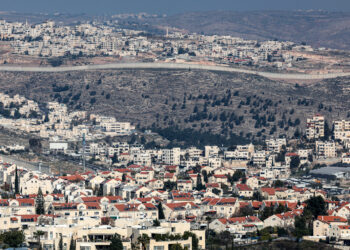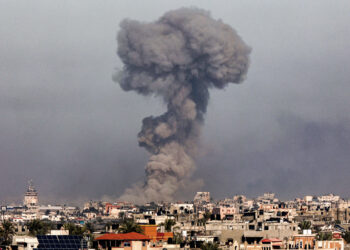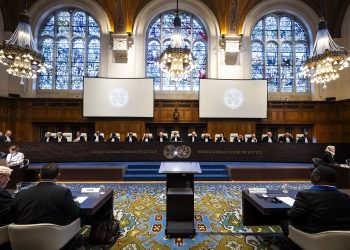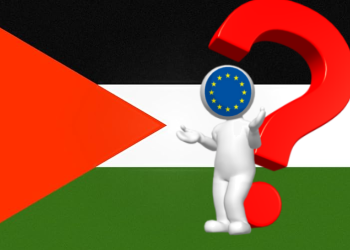Brussels – There were all the ingredients to put pressure on the Israeli government to find a solution to the war in Gaza as soon as possible: the simultaneous presence in Brussels of the foreign ministers of Egypt, Jordan, and Saudi Arabia, the secretary of the Arab League, and – though for separate discussions – the ministers of Israel and Palestine. However, the most anticipated exchange between the 27 Member States and Israeli Foreign Minister, Israel Katz, took on a grotesque dimension.
“I think the minister could have made better use of his time to worry about the security of his country and the high death toll on the Gaza Strip,” is the emblematic comment of the EU High Representative for Foreign Affairs, Josep Borrell, on the sidelines of the Foreign Affairs Council. Basically, after listening to the pleas of the 27 member countries on the excessive number of civilian casualties in Gaza, the need to ensure the continued entry of humanitarian aid, and the importance of ending the forced occupation of Palestinian territories, Katz reportedly showed his European counterparts two videos “that had nothing to do” with the topics at hand.

His first project involved an artificial island to build a harbor opposite Gaza; the second was a railway to connect the Middle East to India. The Israeli minister resorted to some photographs. “I am here today to discuss with my European colleagues two main issues, bringing back our hostages and the dismantling of the Hamas organization, which has been brutally attacking Israel,” he said, showing a photo of an infant and some women still imprisoned in the Gaza Strip. He then declined to answer reporters’ questions.
Without going into the technical merits of the two projects that Borrell, nevertheless, called “very interesting,” it is clear that they were entirely off base, especially imagining how the discussion up to that point could have played out. Some EU countries, Borrell admitted, frontally attacked Israel for the disproportionate military response that has been going on for three and a half months. Belgian Foreign Minister Hadja Lahbib, before the proceedings, said that she would convey, “on behalf of Belgium and the Belgian Presidency of the Council of the European Union,” a call for “an immediate ceasefire, the release of hostages, the respect for international law, and a return to the peace process that must lead to the creation of two states living peacefully, side by side.”
The French and Spanish Foreign Ministers also used harsh tones with Israel. France’s Stéphane Séjourné, called Benjamin Netanyahu’s statements on opposition to a Palestinian state “disturbing” and hoped that in addition to the just sanctions against Hamas terrorists, “in the coming days, sanctions against violent settlers in the West Bank would also be adopted.” Spain’s José Manuel Albares Bueno, on the other hand, pushed for “a permanent ceasefire” and for the “recognition by the entire international community of an independent Palestinian state.” That would include “Gaza and the West Bank, with a corridor to ensure territorial continuity, access to the sea, and the capital in East Jerusalem.” Italian Vice-Premier Antonio Tajani was more cautious, announcing a trip to Lebanon, Israel, and Palestine this week and reiterating: “We are on Israel’s side. Hamas is responsible for what is happening. However, Israel’s reaction can only be proportionate.” Tajani reportedly asked his Israeli counterpart to “pay close attention to the civilian population because 25,000 dead, especially women and children, is something that cannot be accepted.” Before stressing that “the only possible solution, if we want peace, is two peoples and two states. Obviously, Israel must recognize Palestine, and Palestine must recognize Israel.”
In the 12-point – rather generic – plan that Borrell presented, the road to a two-state solution passes through the recognition of a Palestinian state and a preparatory peace conference. “If Israel does not want a solution, it will be difficult for it to participate in the negotiations, but it will not prevent others from working on this front,” the European diplomatic chief warned.
But the solution does not, at least for now, come through a European call for a ceasefire, contrary to what Arab countries wanted. The siege on Gaza, said Jordanian Foreign Minister Ayman Hussein Abdullah Al Safadi, “has produced more destruction than any other conflict in recent history.” Al Safadi returned to point the finger at double standard politics: “Why can’t international law be applied to the Israeli-Palestinian conflict in the same way as in other conflicts?” he angrily asked the press.

Palestinian Authority Foreign Minister Riyad al-Maliki, January 22, 2024. (Photo by JOHN THYS / AFP)
Riyad Al-Malki, Foreign Minister of the Palestinian National Authority, failed to seize those three words from his European counterparts. “I came here to tell my EU colleagues that the most important action to be taken is a ceasefire. We must collectively call for a ceasefire. We cannot accept anything less,” he said upon his arrival.
Al-Malki called on the EU to commit to ending hostilities, to condemn the Israeli government’s statements, and to “start contemplating sanctions against Netanyahu and others who are really destroying the chances for peace in the Middle East.” Inevitably, on this last point, Josep Borrell’s plan toward a two-state solution will also sooner or later clash.
English version by the Translation Service of Withub








![Un motoscafo in Svezia. Nell'Ue si pone un problema di mancato riconoscimento delle patenti nautiche [foto:
Matti Blume, Wikipedia Commons. Copyright: Creative Commons Attribution-Share Alike]](https://www.eunews.it/wp-content/uploads/2024/11/motoscafo-Saltsjoen_Stockholm_P1090679-120x86.jpg)
